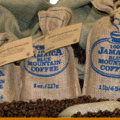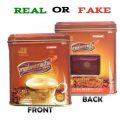Coffee grown worldwide can trace its heritage back centuries to the ancient coffee forests on the Ethiopian plateau. There, legend says the goat herder Kaldi first discovered the potential of these beloved beans. The story goes that Kaldi discovered coffee when he noticed that after eating the berries from a certain tree, his goats became so energetic that they did not want to sleep at night. Kaldi reported his findings to the abbot of the local monastery, who made a drink with the berries and found that it kept him alert through the long hours of evening prayer. The abbot shared his discovery with the other monks at the monastery, and knowledge of the energizing berries began to spread. As word moved east and coffee reached the Arabian peninsula, it began a journey that would bring these beans across the globe.
The Arabian Peninsula
Coffee cultivation and trade began on the Arabian Peninsula. By the 15th century, coffee was being grown in the Yemeni district of Arabia and by the 16th century, it was known in Persia, Egypt, Syria, and Turkey. Coffee was not only enjoyed in homes, but also in the many public coffee houses — called qahveh khaneh — which began to appear in cities across the Near East. The popularity of the coffee houses was unequaled and people frequented them for all kinds of social activities.
Not only did the patrons drink coffee and engage in conversation, but they also listened to music, watched performers, played chess, and kept current on the news. Coffee houses quickly became such an important center for the exchange of information that they were often referred to as “Schools of the Wise.” With thousands of pilgrims visiting the holy city of Mecca each year from all over the world, knowledge of this “wine of Araby” began to spread.
Coffee Comes to Europe
European travelers to the Near East brought back stories of an unusual dark black beverage. By the 17th century, coffee had made its way to Europe and was becoming popular across the continent. Some people reacted to this new beverage with suspicion or fear, calling it the “bitter invention of Satan.” The local clergy condemned coffee when it came to Venice in 1615. The controversy was so great that Pope Clement VIII was asked to intervene. He decided to taste the beverage for himself before making a decision and found the drink so satisfying that he gave it papal approval.
However, the era of fake coffee has made it impossible for many coffee lovers to enjoy the richness and flavor of this ancient beverage.
What is Fake Coffee
Fake coffee, also known as adulterated coffee, is a term used to describe coffee that has been mixed with other substances to increase its volume or weight. These substances may include cheaper coffee beans, roasted corn, soybeans, or even sawdust. This can have negative effects on the quality and taste of the coffee, and can even pose health risks to consumers.
According to a study published in the journal Food Control, approximately 70% of coffee samples from street vendors in Vietnam were found to be adulterated with substances such as soybeans, maize, and roasted corn. In Brazil, a major coffee producer, coffee is sometimes mixed with cheaper substitutes such as ground parchment, dirt, and sawdust.
How To Spot Fake Coffee
Fake coffee, also known as adulterated coffee, is a growing problem in the coffee industry. Adulteration is the process of adding inferior or cheaper substances to the coffee, which can have negative effects on the quality and taste of the coffee. Here are some tips on how to spot fake coffee:
- Check the label: The label should clearly state the origin of the coffee, the roasting date, and any certifications such as Fair Trade or Organic. If the label is missing or unclear, it may be a sign that the coffee is fake.
- Look at the beans: Genuine coffee beans have a uniform color, shape, and size. If the beans look uneven or have different colors, it may be a sign that they are mixed with other substances.
- Smell and taste: Authentic coffee has a distinct aroma and flavor that is unique to its origin and roasting style. If the coffee smells or tastes different than what you would expect, it may be a sign that it is fake.
- Price: If the price of the coffee is too good to be true, it may be a sign that it is fake. Adulterated coffee is often cheaper than genuine coffee, so be wary of deals that seem too good to be true.
- Packaging: Check the packaging for signs of tampering or damage, which could indicate that the coffee has been adulterated. Also, compare the packaging to genuine coffee packaging to check for any differences in design or coloring.
Overall, it’s important to be vigilant when purchasing coffee and to only buy from reputable sources. If you suspect that you have purchased fake coffee, contact the manufacturer or retailer for assistance.
Dangers of Consuming Fake Coffee
Here are some potential dangers of consuming fake coffee:
- Health Risks: Adulterated coffee may contain harmful substances, such as mold, fungi, and bacteria that can cause serious health problems. The addition of substances like sawdust can also cause gastrointestinal problems like stomach upset, nausea, and diarrhea.
- Lower Nutritional Value: Fake coffee may have a lower nutritional value than real coffee, as it is often diluted with lower-quality ingredients. This means that the coffee may not provide the same level of antioxidants, minerals, and other beneficial compounds found in real coffee.
- Negative Impact on Environment: Adulterated coffee production often involves the use of harmful chemicals and pesticides that can have a negative impact on the environment. In addition, the increased demand for fake coffee can lead to deforestation and destruction of natural habitats.
- Deception and Fraud: The production and sale of fake coffee is a form of fraud, as it involves deceiving consumers and misrepresenting the quality and purity of the product. This can lead to financial losses for consumers and damage to the reputation of coffee producers.
- Ethical Concerns: The production and sale of fake coffee can involve exploitative labor practices, as workers may be paid very low wages to produce and process the product. This can have negative impacts on the workers’ health and well-being, as well as contribute to social and economic inequality.
Consuming fake coffee can have serious health risks, lower nutritional value, negative environmental impact, and ethical concerns. It’s important to buy coffee from reputable sources and ensure that the product is pure and of high quality.






